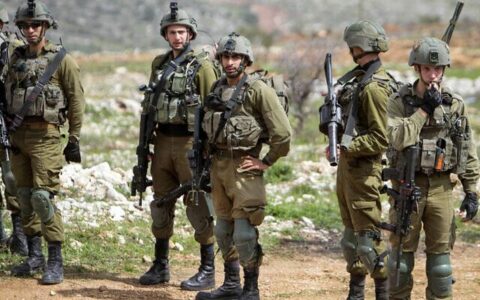
Gantz orders deployment of 1000 soldiers to reinforce police after terror attacks
Defense Minister Benny Gantz on Wednesday ordered the bolstering of police forces with 1,000 Israel Defense Force soldiers following a string of deadly terror attacks.
The combat soldiers — who are still in training — will be deployed to the borders of the West Bank, as well as within Israeli cities, according to police needs, Gantz’s office said.
Gantz said that since four people were killed in a stabbing and ramming attack in Beersheba last week, the West Bank had been bolstered with 12 extra battalions and the border with the Gaza Strip with another two.
There have been another two terror attacks this week, the more recent of which, on Tuesday night in Bnei Brak, killed five people, one of them a police officer. Two Border Police officers were killed in the previous attack in Hadera on Sunday night.
Gantz said the defense establishment would focus on locating potential attackers on social media, foiling attempts of Palestinians to enter Israel illegally, and disrupting weapon deals.
The military will also offer logistical assistance to the police, if required.
The moves came following a meeting of top defense and military officials.
“The IDF is prepared for a variety of scenarios, is acting and will act as necessary to maintain the daily routine of Israeli residents,” IDF chief Aviv Kohavi said at the meeting, according to a statement.
“IDF troops are deployed with the utmost vigilance in various areas in order to strengthen the sense of defense and the sense of security of the residents of Israel,” he added.
Foreign Minister Yair Lapid, meanwhile, urged against letting anger over the recent spate of terror attacks split Israeli society, saying that such divisions are a goal of the terrorists.
In a joint statement with visiting Austrian Foreign Minister Alexander Schallenberg, Lapid offered a message of unity in Hebrew.
“The goal of terrorism is not only to strike innocents but to cause us to hate and be angry at one another,” he said. “To undermine, and to pull apart Israeli society from within.”
“The terrorists want to see violent riots on Israel’s streets,” Lapid continued.
Lapid stressed that expressions of hatred do not enhance security, but rather sow fear and make the work of security forces more difficult.
“We won’t let the terrorists determine our policy, and we won’t let the terrorists tear us apart from within,” he said. “In the face of the difficult images, we must unite and maintain self-control.”
Turning to Schallenberg in English, Lapid said “the best response to terror” was events like the Negev Summit in Israel earlier this week, which was attended by four foreign ministers of Arab countries as well as US Secretary of State Anthony Blinken.
“Peace and friendship are the alternatives to violence and chaos,” Lapid continued. “We choose peace through strength.”
Schallenberg, speaking in English, began by sending his condolences to the families of the victims of the “hideous attack.”
“I want you and I want the people of Israel to know that Austria stands side-by-side with you,” he said. “We are conducting this fight together.”
The first two attacks over the past week, in Beersheba and Hadera, were carried out by Israeli Arabs, while Tuesday’s shooting was by a Palestinian who was in Israel illegally.
They marked the most terror fatalities in the space of a single week in Israel since 2006, when a suicide bus bombing killed 11 in Tel Aviv. The assaults have exacerbated concerns about an escalating wave of violence ahead of the Muslim holy month of Ramadan.
Dozens of locals protested at the scene of the attack in Bnei Brak chanting “Death to Arabs,” and “Revenge,” while Arabs demonstrated at Damascus Gate in Jerusalem and celebrated the attack in Gaza and the West Bank.
Last May, tensions around Ramadan and an 11-day conflict with the Gaza Strip escalated into the worst rioting in decades between the Jewish and Arab communities. Arab Israeli leaders have condemned the recent terror attacks.
Source: Times of Israel





